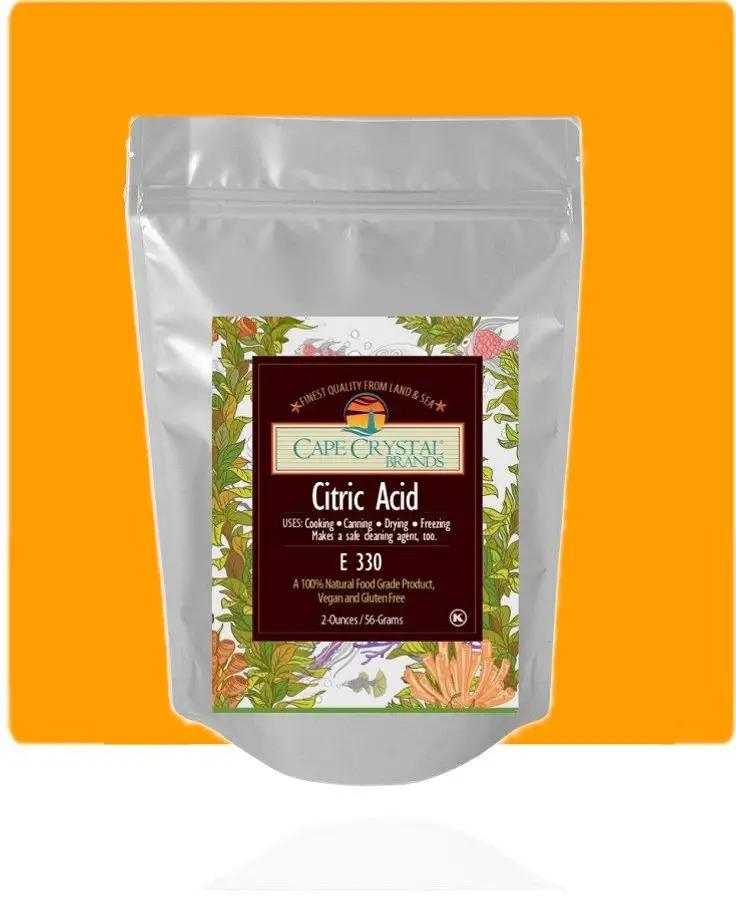
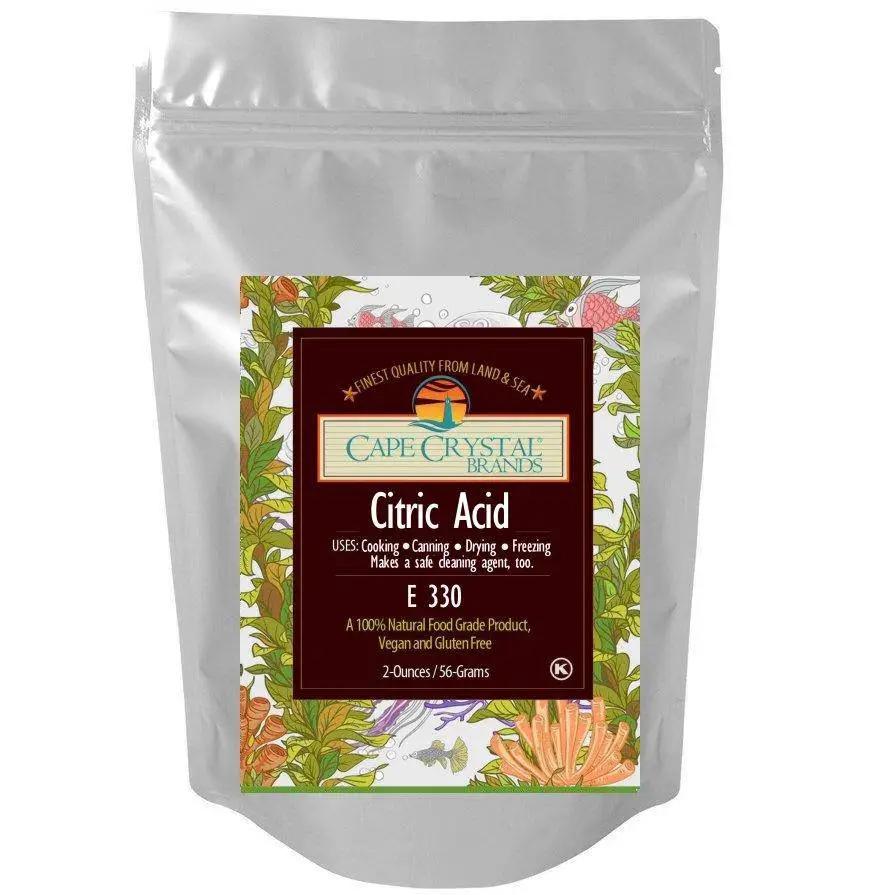
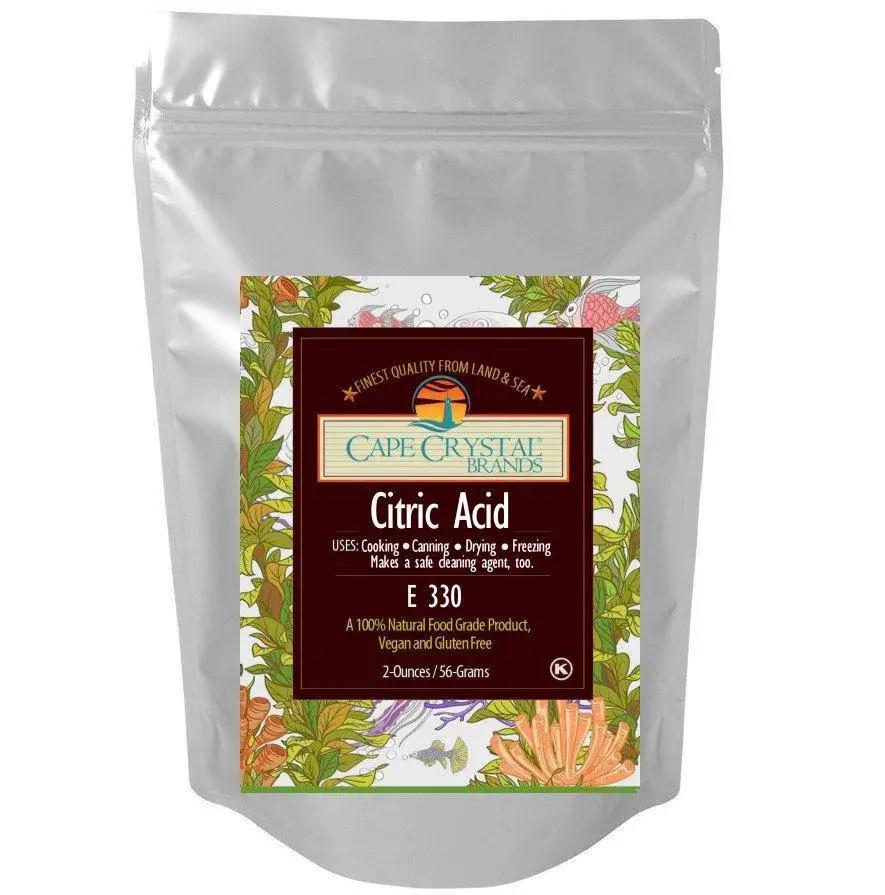
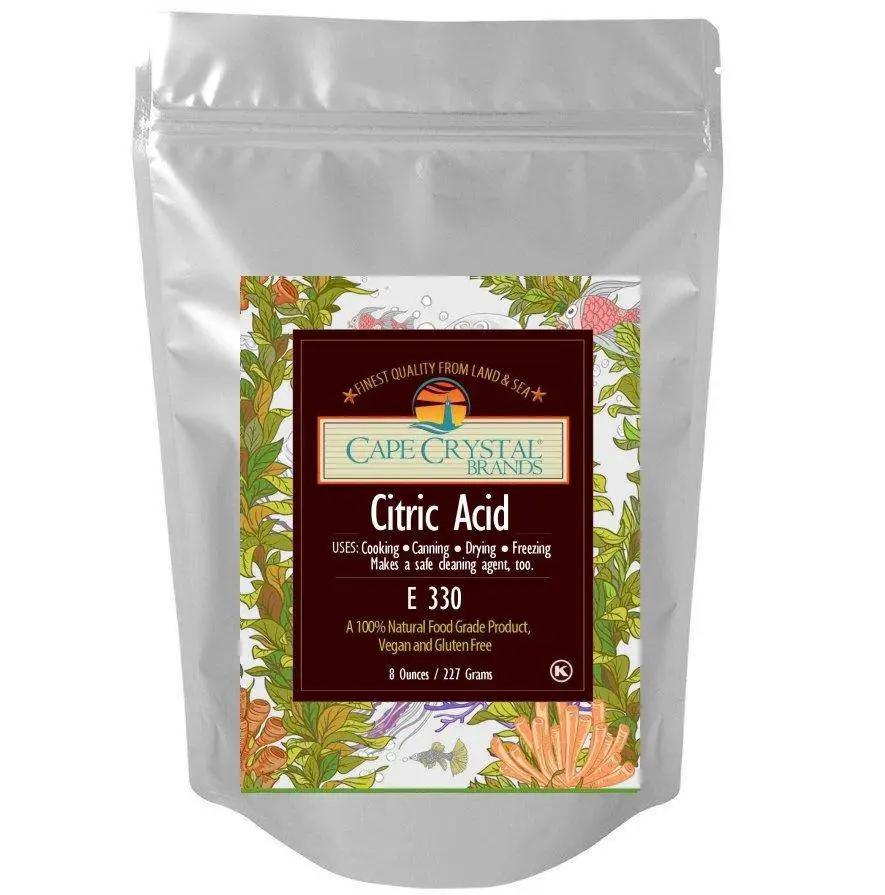
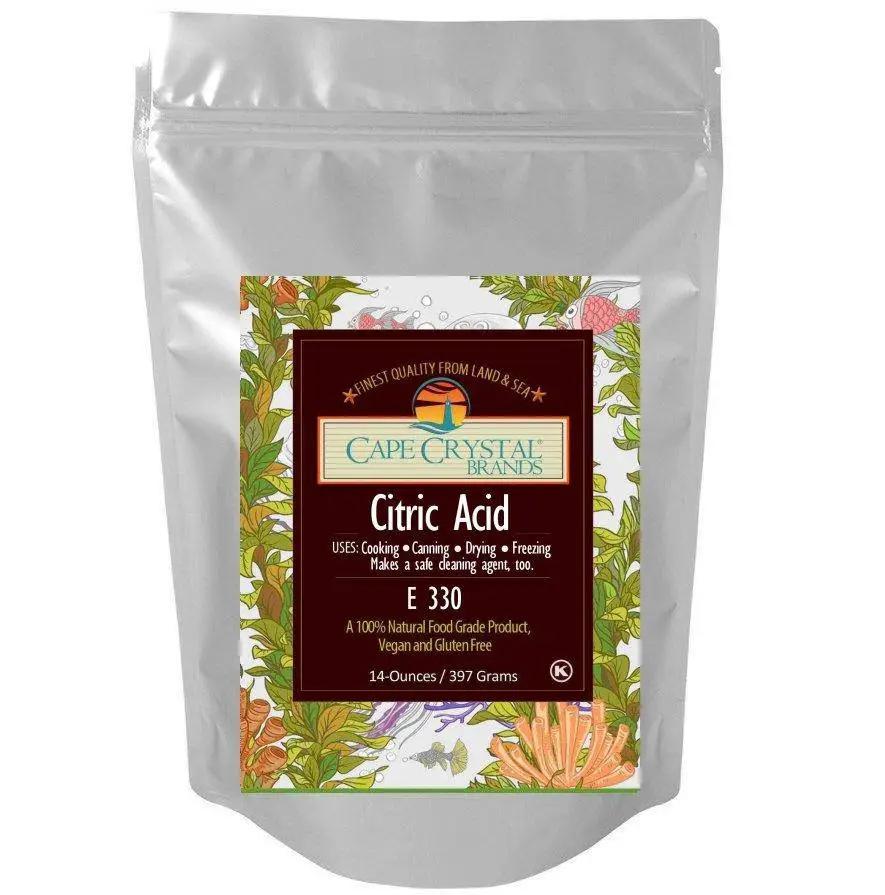





Citric Acid
- Price
- $3.95
Size: 2-oz
Frequently Bought Together
We Accept
PROPERTIES
Gluten-Free, Plant-Based, Kosher (K)
Pure Citric Acid
None
Product Information
✅ Buying Citric Acid Powder at best price with FREE shipping. The fine granular NON-GMO citric acid is a kitchen essential used in preserving, flavoring, and cleaning completely; preserves the Vitamin C content of a food product.
✅ Adds an acidic or sour taste to meat, candy, soft drinks, and ice cream. It keeps fruits and vegetables fresh and food flavorful.
✅ When buying citric acid, remember it is perfect for craft making, candy making, pH adjustment, water softening, and more!
✅Perfect for bath bombs, used as the main ingredient along with backing soda (sodium bicarbonate) to make the bath bombs fizz away!
Citric acid is often added to packaged foods and drinks. It helps keep canned foods fresh over long periods of time. It also prevents certain foods from turning brown. Citric acid can also help thicken foods or give them a slightly sour flavor. Citric acid can be found listed as an ingredient in some ice creams, sorbets, or sodas. When buying citric acid remember Cape Crystal Brands for high quality.
As renowned Chef Oliver Bennet of Cape Crystal Brands, I have always been intrigued by the science behind the flavors we use in our kitchens. One such component is citric acid. This humble ingredient is an amalgamation of science meeting flavor; it’s the mystery behind the tanginess in our beloved dishes, yet few truly understand its nutritional dynamics. In this article, we aim to demystify citric acid, its uses in cooking and its often-overlooked nutrition facts. Unveiling the science behind this flavorful beast is essential to create culinary masterpieces.
What is Citric Acid?
Citric Acid, the key ingredient in many food products, has traversed from being just a naturally occurring citric substance found in acid apples to a widely used additive known as anhydrous citric. This chemical citric, also a tricarboxylic acid, stands out as an incredible element in almost every chef's space. It's noted for its ability to enhance flavor and preserve food, making it an essential product in the culinary industry. Cape Crystal Brands stands at the forefront of delivering quality citric acid that meets the highest standards.
Although this citrate can be manufactured, the impact and flavor profile offered by natural citric acid remain unrivaled. Whether it's naturally occurring or artificially created, citric acid's role can't be overlooked. Food science has even indicated that incorporating this acid into your diet can offer nutritional benefits. So, it's accurate to say that this chemical is where science meets flavor.
Citric Acid: A Prominent Molecule in Food
Citric Acid, a prominent molecule in food, imbues a plethora of dishes and food products with a tangy twist. It's prevalent in foods such as lemons and other citrus fruits. Yet, citric acid also marks its presence in numerous processed foods where it serves to enhance flavors and preserve freshness. When considering food citric acid, it might be easy to overlook its multifaceted nature. Products citric acid is more than just a taste-enhancer—it plays a vital role in numerous biochemical processes essential for our health. Foods and food products rely heavily on citric acid for their zesty zing. More so, products like beverages, canned goods, dairy items, and sweet treats often use citric acid as a natural preservative. Despite its ubiquitous nature in food products, citric acid contributes significantly to the nutrition profile of these items. Further exploration into this multipurpose molecule reveals how integral it is to our daily diet and food consumption patterns.
Natural Food Sources of Citric Acid
One can't talk about citric acid without recognizing its primary natural food sources, largely found in citrus fruits. Citric acid's occurrence in our diets is prevalently due to these fruits. Citrus fruits like oranges, grapefruits, tangerines, and lemons are all potent sources of this remarkable acid. Lemon juice is considerably high in citric acid, with nearly 1.44 grams per ounce. It's no wonder that citrus fruits and lemon juice are essentials in many culinary creations; they deliver a fresh blast of flavor whilst providing this beneficial acid. However, the acid's natural sources are not limited to citrus fruits. Various fruits like pineapples, strawberries, and tomatoes can also enrich your diet with this acid. Making good use of this sure diversifies your food sources and ensures a regular intake of this nutrient. As you savor the zesty tang of citrus and other fruits, remind yourself of the hidden benefits you're enjoying.
The Role of Citric Acid in Health and Nutrition
Within the realm of health and nutrition, citric acid has carved a significant role for itself. It's pivotal to our body's metabolic processes and even plays a part in our daily caloric intake. But beyond that, citric acid's role in nutrition goes even further. Not only does it naturally enhance the flavors in our foods, but its presence also carries important safety implications. It's crucial for food safety standards, reducing the risk of harmful bacteria to the environment while extending shelf-life.
The link between citric acid and health is typically overlooked but undeniable. It’s beneficial for bone health due to its calcium content, aids in energy production because of its crucial part in the Krebs cycle and promotes kidney health by preventing kidney stones. These advantages to health, in addition to citric acid's proficiency for safety and its importance to nutrition, make it a necessity not just for our palates, but more importantly, for our overall health and well-being.
Artificial Sources and Uses of Citric Acid
While the tangy touch of citric acid can be richly found in nature, it is also manufactured extensively for a variety of products. This manufactured citric acid, often a byproduct of Aspergillus niger, a harmless black mold, has remarkable versatility. This mold, cultivated on a grand scale in enclosed spaces, enables the mass production of acid.
The manufactured version of the acid is not inherently artificial. Even though it's grown with the aid of mold, the resulting product is chemically identical to the citric acid found in lemons and limes. The distinction between the two is purely source-based.
Including citric acid in products elevates their appeal. It’s used in foods, beverages, pharmaceuticals, and cosmetics, imparting a refreshing tartness and acting as a preservative. The prevalent use of acid in such a broad range of products reinforces the importance of both natural and manufactured sources of citric acid.
Citric Acid: An Essential Preservative in Food Industry
Citric acid isn't simply a tangy flavor enhancer found in your favorite citrus fruits. It's also a powerhouse preservative that's central to the food industry. It's a crucial agent in maintaining freshness and extending the longevity of countless food products, and it's safety for consumption gives it an assured place in our food supply.
Despite its omnipresence in the food industry, you might not always see 'citric acid' listed on a food product's label. This is because citric acid often hides behind more generic terms like 'preservatives' or 'acidity regulators'. Regardless, it's prevalent in a wide variety of food products- everything from canned goods to pastries.
So, whether you're preserving fresh fruit or enhancing the flavor of baked goods, you're likely making use of citric acid. Besides, beyond its culinary contributions, it's worth noting citric acid's role in health and nutrition. From bone health to metabolic process, citric acid plays a vital role. All in all, when it comes to the food industry, citric acid truly is an essential ingredient.
Health Benefits and Body Uses of Citric Acid
The health benefits of citric acid, present in everyone's diet, are quite numerous and its incorporation into the body uses certain mechanisms that promote overall wellbeing. First off, citric acid plays a crucial role in the digestion process. It helps break down food, supplements calcium absorption, and boosts metabolism. Additionally, citric acid benefits those looking to lose weight as it can suppress the appetite and reduce fat storage.
Secondly, giving citric acid its importance in the supplements industry, it often acts as the base in supplements, aiding in magnesium absorption and enhancing their overall efficacy and stability. Lastly, its antioxidative property also contributes to the health benefits we draw from a citric acid-rich diet. It's important to note that citric acid is recognized by the FDA as safe for consumption. These health benefits make citric acid not an ordinary substance, but a vital element of the modern health-oriented lifestyle.
Is Citric Acid Good for Health? A Detailed AnalysisIn the landscape of our daily menu, citric acid plays a prominent role. Citric acid, an all-essential molecule, is naturally found in citrus fruits. This acid, however, extends beyond its natural sources. Artificially derived citric acid, for instance, forms an integral part of the food industry as a crucial preservative, impacting not just the flavor but our overall health as well. However, is citric acid truly beneficial to our health? Here's a detailed analysis.
Scientifically speaking, citric acid has been shown to foster numerous health benefits. This is primarily because acid aids in the metabolic process, ensuring the smooth functioning of our bodily systems. Therefore, incorporating citric acid into our diet can potentially enhance our health. On the contrary, the overuse of this acid, especially within processed food, can negatively impact health. Hence, it is, indeed, more a matter of proportion rather than the acid itself.
So, while citric acid does have its inherent benefits, the key lies in its balanced and mindful use, ensuring our health does not get subjected to the ill-effects of its overconsumption.
Safety and Risks Related to Citric Acid
Citric acid is a substance widely used in our daily life, especially in the food industry. Its safety has been well established, even when it comes in touch with our skin. However, it's human nature to be cautious and consider the potential risks involved. When it comes to citric acid, the potential skin threats primarily revolve around sensitivity. While most individuals can handle its use on their skin with no adverse reactions, some people with sensitive skin might experience irritation or allergic reactions. So, it's always best to test a small area of skin first. The citric acid's effect on your skin may largely depend on the form in which it's used and the concentration. Remember, safety first! Be knowledgeable about what’s going on with your skin and ensure you're not exposing yourself to unnecessary risks. At Cape Crystal Brands, we deeply understand these safety concerns and strive to provide products that prioritize both your health and safety.
Addressing Health Concerns: A look at the Safety of Citric Acid
As we continue through our deep dive into the realm of citric acid, the importance of addressing associated health concerns can't be overlooked. Taking a closer look at the safety of citric acid, it is essential to acknowledge that this prevalent molecule poses minimal hazard to human health. Its safety is primarily due to its presence in vast quantities in our usual diet, due to both natural and artificial sources. Regardless of its immense benefits, it is important to not mistake its breadth of application for an absence of potential health risks.
For individuals with sensitivities, citric acid may sometimes lead to minor reactions. As with all food products, personal health history and individual physiological characteristics must be taken into account when considering the safety and overall health impact. Rest assured, numerous health and regulatory agencies, including the U.S. Food and Drug Administration, have deemed citric acid safe for general consumption. The journey towards better health always involves making informed choices, and in the case of citric acid, it is no exception.
The Bottom Line: Citric Acid in Daily Life
In wrapping up our comprehensive look at citric acid, it's time to summarize the bottom line: citric acid is substantial in our daily life. As Chef Oliver Bennet, one of Cape Crystal Brand's culinary experts, the prevalence of this molecule in daily life is not to be underestimated. From lending a tangy flavor in food to acting as a preservative in the food industry, citric acid is omnipresent. Citric acid's role doesn't stop at taste; it boasts an array of health benefits too. In artificial sources like soft drinks and candies to natural sources like citrus fruits, citric is deeply ingrained in our diets.
The health debate continues for artificial citric; however, from a nutritional standpoint, citric acid occurring naturally in food is wholly significant. Despite the arguments, the safety of citric acid has been well-documented. So, the verdict on the necessity of citric acid in daily life is crystal clear—it’s an essential, flavorful component of our diet and overall health.
Citric Acid: The Powerful Molecule in Our Daily Foods
Citric acid, a powerful molecule, is far more common in our daily foods than you might think. This crucial ingredient, integral to the distinctive tang of many of our favorite foods, is also found in numerous artificial sources. As a key component in Cape Crystal Brands, it's vital in the preservation of food, preventing spoilage and maintaining fresh flavors for longer. Beyond its culinary uses, citric acid serves critical roles in health and nutrition too.
Allowing for a smoother metabolic process, and acting as an antioxidant, it's a molecule whose benefits cannot be overlooked. However, like any other substance, an understanding of its safety and risks is necessary. In most cases, it's perfectly safe, contributing unique tastes to our foods without posing any significant health concerns. So, while diving deeper into science may uncover more about this powerful molecule in our daily foods, the bottom line is that citric acid truly meets the intersection of science and flavor in its use and nutrition facts.
Industrial Biotechnology Production of Citric Acid
The industrial biotechnology production of citric acid has remarkably redefined food chemistry, providing a pivotal balance between taste and health. This dicarboxylic acid represents a significant portion of industrially produced chemicals, giving us reason to appreciate advancements in biotech. The production process involves a fascinating journey, deeply steeped in science. It kicks off with fermentation, a bioprocess that gracefully merges biology with technology to yield citric acid.
Citric acid is more than just a sour taste on our tongue; it’s an everyday essential that dances on our taste buds and presides over our wellness. With every lick of a citric ice popsicle or sip of a tangy lemonade, we are imbibing the refined product of an industrial miracle. As we've seen in our series from Cape Crystal Brands, understanding the science behind citric acid gives us an appreciation for this ubiquitous micronutrient. Every citric-accented food we consume is a testament to the seamless union of gastronomy with industrial biotechnology.
Emerging Trends in Citric Acid Production
In the rapidly evolving world of food science, emerging trends in citric acid production continue to reshape the landscape. Latest innovations have seen a shift towards bio-based and sustainable methods to produce citric acid, one of the most important ingredients that adds zest to beverages and acts as a natural preservative. Its wide array of applications, particularly in beverages, is a testament to its versatility and important role in the culinary field. Citric acid is renowned for being a natural calcium chelating agent too, presenting yet another view of its potential applications in the food industry.
A closer look at these emerging trends reveals the dedication to developing sustainable, environment-friendly processes and the pursuit of ensuring safe and reliable sources of this crucial ingredient. Citric acid’s influential role extends beyond the test kitchen to manufacturing plants. Its impact cannot be overstated, considering its capacity to bind with calcium and its widespread use in drinks. Such developments offer a new view on how citric acid production will be viewed in the future.
Conclusion
Understanding the balance between science and flavor when it comes to citric acid is crucial in the culinary world. Its combination of nutritional benefits and exceptional fusion potential makes it an essential ingredient in various culinary applications. Cape Crystal Brands provides only the best quality and trusted citric acid, ensuring that your culinary masterpieces not only taste delightful but also promote good health. Stay adventurous in your culinary journey, and never forget the unbounded potential that citric acid brings to your feast!
Here are some delicious recipes to try that feature this ingredient:
FRANCO-AMERICAN CREAM CHEESE – Cape Crystal Brands
DELICIOUS CARAMEL SAUCE with a CITRIC ACID ZIP – Cape Crystal Brands
Recommended for You
Browsing history
- Choosing a selection results in a full page refresh.
POLICY PAGES
CONTACT INFORMATION
Cape Crystal Brands, 18 Bank St., Suite 1, Summit NJ 07901.
- Phone: +1 908-273-5600
- Email: info@capecrystalbrands.com
- Tax ID: 26-2477626000
- FDA Facility Registration # 16980627550
- Kosher Certified: OKosher.org
Country/region
© 2024, Cape Crystal Brands | Sitemap
